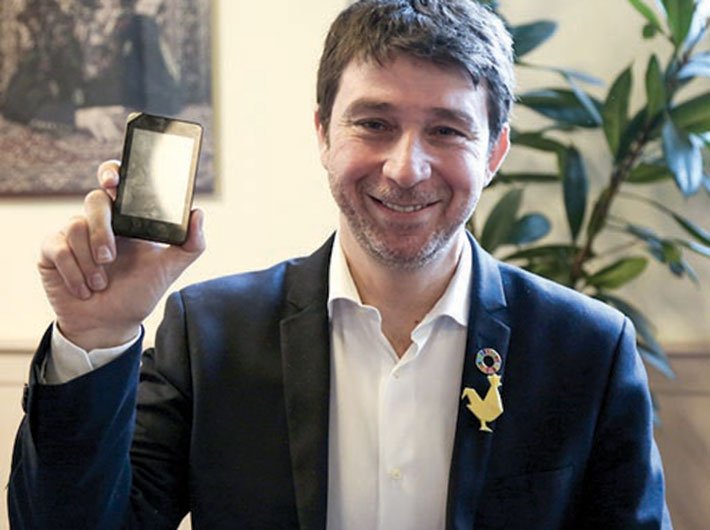Lionel Baraban, CEO of Famoco, talks about how the French tech firm is developing secure business devices to safeguard data against going to other countries
Data is the new oil; and it needs to be protected. In an interaction with Governance Now, Lionel Baraban, CEO of Famoco, talks about how the French tech firm is developing secure business devices to safeguard data against going to other countries.
What are the major roles of Famoco?
Our major job is to validate digital transactions. People tend to see digital transaction only as payments, but in reality, digital transactions are everywhere. When you pay for a bus; when you control an ID card that is a transaction with the government; a passport is a transaction with the two governments. So we validate transaction in payment, in transportation, identification, etc.
For us, India is a fantastic market. It is soon going to be ahead of other countries in terms of digital payments. Why do we pay with credit cards? Because a card validates who you are. I can’t exactly know who you are, but I can identify the card. Instead of paying you, I am paying the card. But now with Aadhaar, which is a national biometric database, we can directly identify anyone. So I see a convergence between identification and transaction happening everywhere in India. We can help India in digitising more transactions and getting security in those.
Security is the key. We should keep systems simple and secure, which is a big challenge. Today big security companies in order to secure everything close everything and then you don’t have a flexible system anymore. But in a country like India, which is complex and diverse, you cannot have one system for everyone.
You said we are becoming American digital colonies. Please elaborate.
I believe we all are becoming American digital colonies. Today, 90 percent of the world’s phones are Android. So everything we do is recorded by the phone and sent to Google. On transaction on POS (point of sale), the data is pure. This metadata created by digitisation of transactions is very crucial and key data. And if you do not pay attention, all that metadata is sent to Google.
This data is the oil and treasure of tomorrow.
India should pay attention and retain that metadata which belongs to Indians and not Google. Now what we are trying to explain to the Indian government is that today we have technologies that create PoS where the metadata stays in the country. Metadata is not a bad thing itself, it can be used for good. But it will be the oil of tomorrow’s economy and that oil belongs to Indian companies. We are trying to help India to get Android OS. At Famoco, we make secure Android terminals.
Indians have reservations on sharing data with the government.
It is a problem all over the world, not only in India. I believe that metadata first belongs to the service provider and they need not buy back that data from Google.
The entire business model of Android is ‘I give you technology for free against your data’. That means technology is not the product; you are the product. This is the idea. I firmly believe that technology is not free. India is a country of engineers; they have a family, and they need to be paid. When a big company says that this technology is free, Android is free software, there is a something wrong. So particularly in payments, for security and metadata reasons we need to make sure that the data is not leaving the terminals and staying in India.
How do you do that?
There are two versions of Android. One is licensed and the other is AOSP (open source version). We take AOSP version and recompile 100 percent of the source code, so we clean everything you do not need. Our devices are not B2C (business to consumer) they are B2B (business to business). So I do not need all the trackers, gaming, etc. I just need an OS, which can securely run applications. The idea is to have an OS, Android-based, fully secured on which you can run any Android app but controlled and managed. We will also start producing devices in India soon.
We have collaborated with State Bank of India, transportation companies and logistic companies. In Sri Lanka, we have done all transportation and a lot of similar things.
How do you see the upcoming payment feature on WhatsApp?
It is very interesting. All mobile payments are mainly built for peer-to-peer payment. If you want to exchange money, they are fantastic, but the question is for merchant payment. Now if you go to the merchant and make payment; will that money go to the person, the merchant or the corporation? For a merchant payment, you need a professional device. So we have a cheap, simple, secure, flexible merchant device on which you can put any solution like WhatsApp, Paytm, etc.
There is so much of hype about Blockchain technology these days. Your views?
What makes our Android devices secure is the embedded security element. There is a sort of smart chip embedded in the device. Any cryptocurrency or blockchain is based on two keys, a public and a private. The question is where do you store your private key? And everyone is talking about a trusted environment, but in reality all are highly crackable and insecure. The only proper way to secure the private key is to put it in a secure element. There is a French company called Ledger; it has a very secure element on a USB stick to store the blockchain private key. Now our devices are online Android devices with the embedded secure element on which you can store your private key. Our devices are used in several countries as blockchain POS. Personally, I do not believe that cryptocurrency is a fantastic thing, but I believe that blockchain is great to secure contracts, secure data, to anti-counterfeiting, to exchange as it does not need any third entity. The trusted entity is the network. And it gives you great resilience into your network. So if something fails you have another one. This is fantastic. We are big blockchain believers, and we have a big investment in blockchain not necessarily in cryptocurrency.
Did you face any policy challenges in India?
Yes. But the reality is, you always need to balance the challenges in the form of possible reward. India is a great market and worth the trouble. Don’t believe it is simple in Europe. Today we are producing in China, and we have a huge challenge there. You need to check every single step of production to ensure the quality of the product. In France also we face challenges. ‘Challenge-free’ does not exist: there are different kinds of challenges that you tackle at different places.
[email protected]
(The interview appears in the April 30, 2018 issue)



